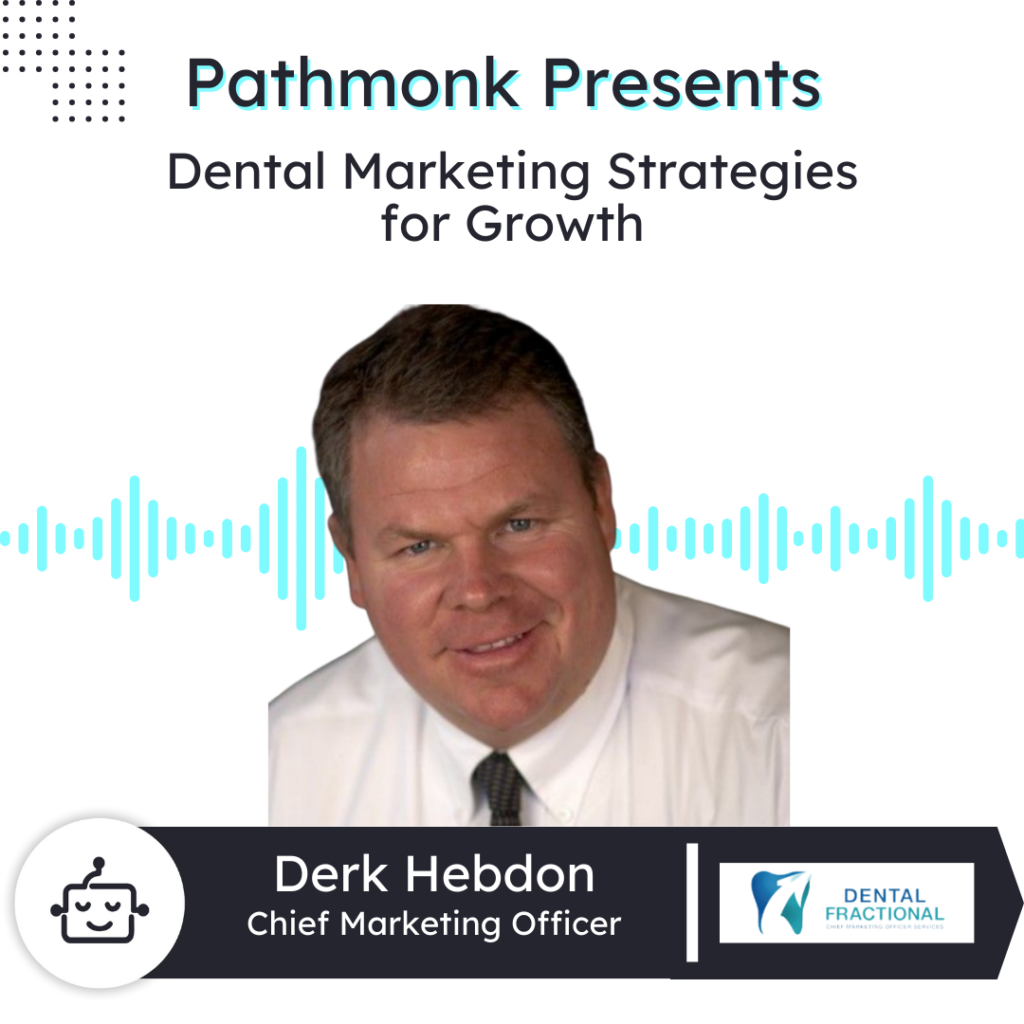
Introduction
In this episode of Pathmonk Presents, we welcome Derk Hebdon, owner of Dental Fraction CMO Services. Derk brings his expertise as a fractional Chief Marketing Officer specializing in dental practices.
He shares invaluable insights on high-level marketing strategies for dental offices looking to scale their operations. From leveraging AI for pre-targeting to optimizing online presence and building trust through consistent messaging, Derk covers a wide range of tactics to keep dental chairs full with high-value patients.
Learn how fractional CMO services can help established practices reach their next level of growth through innovative marketing approaches and cutting-edge technologies.
Increase +180% conversions from your website with AI
Get more conversions from your existing traffic by delivering personalized experiences in real time.
- Adapt your website to each visitor’s intent automatically
- Increase conversions without redesigns or dev work
- Turn anonymous traffic into revenue at scale

Kevin Shirley: Hello, everybody. Welcome to the Pathmonk Presents podcast. Pathmonk is the AI for website conversions. With increasing online competition, over 98% of website visitors don’t convert. The ability to successfully show your value proposition and support visitors in their buying journey separates you from the competition online. Pathmonk qualifies and converts leads on your website by figuring out where they are in the buying journey and influencing them in key decision moments with relevant micro experiences—experiences like case studies, intro videos, and much more. Stay relevant to your visitors and increase conversions by 50% by adding Pathmonk to your website in seconds, letting the artificial intelligence do all the work, and increasing conversions by 50% while you keep doing marketing as usual. Check us out on pathmonk.com.
Hey, everybody, welcome to the Pathmonk Presents podcast. Today we’ve got Derk from Dental Fraction CMO Services. Derk, how are you today?
Derk: Good. How are you doing? Pleasure to be here.
Kevin Shirley: Thanks for joining us. So, today we’re going to be doing a little bit of a podcast talking about how you and your business do different types of marketing and growth strategies for your dental clients as a dental fractional CMO. To get things started, I just wanted to open things up with a little bit of a more generic, broad question. I see that you are the owner of Dental Fraction CMO Services, and maybe you can tell me a little bit more about what that is, what you do, and, yeah, just a little background.
Derk: Okay, well, first of all, I am a CMO. So, as a CMO, it’s a Chief Marketing Officer, and I’m actually a fractional Chief Marketing Officer. In other words, a part-time, outsourced CMO specifically geared for dental practices. Most dental offices can’t really afford a full-time, six-figure CMO. And so the trend now is getting a seasoned fractional CMO on board to help steer them to the next level. Basically, what I do is provide high-level, comprehensive dental marketing strategies and then execute those strategies. That spans everything from just consultative marketing, working with an existing marketing team that a dental practice already has, to providing a full suite of marketing services through a partnership agency that I work with.
Kevin Shirley: Excellent. Just a little curious to follow up on that—do you find yourself working more frequently with practices that have just started and maybe use this as a way to save some money? Or do you find yourself working more frequently with established practices already? I’m just curious.
Derk: Yeah, good question. Really, it’s those that are established and ready to take it to the next level. Obviously, having somebody—even part-time—helping startups with their marketing, they’re just not ready yet financially and don’t have the tools necessary. Typically, I usually come in when a dental office has anywhere from two to three associated dentists on board. They might have a team of 10 to 15 and are just ready to take it to the next level. They might be looking to either expand their existing location or actually acquire other locations or expand to new ones. So, they’re just looking to grow.
Kevin Shirley: Yeah. Bring in Derk when you’re ready to reach that next level, right?
Derk: There you go. That’s the key.
Kevin Shirley: The next question that I want to ask is another curious question of mine. Do you focus on any specific areas of dentistry, or what problems do you solve for dentists in specific areas?
Derk: Yeah, good question. My focus, or our focus—my team’s focus—is on cosmetic dentistry. Dentistry in general ranges all over the board, but we specifically focus on cosmetic dentistry. And really, it has expanded to almost everything from general dentistry all the way to reconstructive full-mouth makeovers with dental implants. What we do is solve the problem of keeping those dental chairs full. It’s inventory, and if that inventory is empty, it’s gone—gone forever. So what we do is keep those chairs full of great patients paying for higher-end treatments. Of course, we do that through consistent new patient acquisition combined with keeping existing patients coming back more often.
Kevin Shirley: That’s really well said. That kind of segues nicely into my next question because when you talk about keeping those chairs full, obviously you need to be reaching different audiences. You need to make sure you’re constantly finding new customers. You can’t always rely on the old customers coming back. How do you position your dental practices—your clients—so that people will continuously find out about them?
Derk: Excellent. You’ve always got to be building because you’re going to have attrition—people do move or, unfortunately, pass away. One thing I’ve learned in all the years I’ve been doing marketing, particularly dental marketing since 2010, is that people do business with people and clinics they know, like, and trust. But if they’re not found online, none of that matters. So, we break this down further. How do they get to know you? Typically through the website, content marketing, blogs, or videos. Then, automation with funnels—landing pages, email, and SMS marketing.
How do they like you? That’s typically through social media—establishing optimized social media pages on platforms like Facebook, Instagram, X (formerly Twitter), and Google My Business, with consistent branding across all platforms. Then, build a following and engage them with great content.
How do they trust you? This is achieved through online reputation management. We optimize directories to ensure correct practice data, establish an online presence with great reviews, and spotlight those consistently. Anything over six months isn’t as relevant anymore. We market that reputation on websites, landing pages, and social media.
Lastly, we ensure they get found. We achieve this through Facebook and Google Ads, Google My Business local SEO, and a relatively new strategy—pre-targeting—using AI.
Derk: Pre-targeting with AI is fascinating. It better understands user intent, context, and preferences compared to Google’s traditional algorithm. What we do is program AI to monitor local search traffic, identify high-buyer keywords, and determine user behavior. It captures digital footprints like IP addresses, connects to big data, and identifies potential patients. We get detailed information, such as names, emails, phone numbers, physical addresses, income ranges, and the specific keywords they searched for. This kind of data allows us to build targeted strategies and even create lookalike audiences for our ads.
Then there’s retargeting—bringing visitors back to the website if they didn’t convert. With AI, we can now capture 30% to 70% of those website visitors who didn’t fill out forms. This makes it possible to re-engage them with relevant messaging.
Kevin Shirley: That’s incredible. And you’re right—around 98% of website visitors don’t convert, so having tools to capture and re-engage that audience is more critical than ever. It sounds like the combination of targeting and messaging is key to success here.
Derk: Absolutely. Targeting and messaging are everything. If the messaging isn’t relevant, visitors will leave. The right creatives and messaging make a huge difference in resonating with the audience. Once we bring them back to the site, we use tools like chatbots to engage them and even schedule appointments—all while ensuring everything remains relevant to their needs.
Kevin Shirley: That makes a lot of sense, especially when you’re dealing with such an important industry like dentistry, where trust is paramount. I can imagine that establishing trust through the right messaging is critical. After all, patients are entrusting dentists with their health and appearance.
Derk: You’re spot on. Trust is the cornerstone in dentistry. Patients want to feel confident in the skills and expertise of their dentist. So, we emphasize consistent branding and messaging across all channels—social media, websites, and email campaigns. Cross-channel promotion ensures that potential patients see a cohesive message everywhere. For example, we might promote a dental implant guide that answers all their questions, including costs and affordability. This kind of content builds trust and positions the dentist as an authority in their field.
Kevin Shirley: That’s a great strategy. Let’s shift gears a little and talk about your role as a fractional CMO. What does your typical day-to-day work look like? What tasks are you most focused on?
Derk: My day-to-day involves reviewing reports—everything from ad impressions and landing page clicks to email and SMS campaign performance. I also monitor chatbot engagements and team communications, typically through Slack or WhatsApp. Beyond that, I spend time working on creatives, ads, targeting, and content guides. I enjoy the challenge of adjusting strategies based on performance metrics. Marketing is all about testing and iterating—what worked yesterday may not work tomorrow, so you need to stay flexible
and adapt to changes quickly. I also touch base with clients regularly to ensure they’re satisfied and that everything is aligned with their goals.
Kevin Shirley: It sounds like you have a very dynamic role with a lot of moving parts. Let’s jump into some rapid-fire questions for fun. Are you ready?
Derk: Let’s do it!
Kevin Shirley: Great! First question—what’s the last book you read or listened to?
Derk: I’m more of a listener than a reader. The last audiobook I enjoyed was The Ultimate Sales Machine by Chet Holmes. It’s full of practical strategies and education-based marketing tips that are super relevant today.
Kevin Shirley: Awesome choice. If there were no boundaries in technology, what’s one thing you’d want to fix for your role as a fractional CMO?
Derk: I’d love to duplicate myself! Imagine being able to download my knowledge, skills, and intuition into multiple versions of me so I could help more businesses at once.
Kevin Shirley: That’s a cool idea—maybe AI can help with that someday. What’s one repetitive task you’d automate immediately?
Derk: Data crunching. I’d love a tool that analyzes all the metrics, highlights insights, and offers suggestions with projected ROI for each option. That would save so much time.
Kevin Shirley: Definitely a time-saver. Last question—what’s one piece of advice you’d give your younger self when starting out as a marketer?
Derk: Learn marketing and people psychology as early as possible. The combination of understanding human behavior and using data-driven decisions is incredibly powerful. I wish I’d dug deeper into both earlier in my career.
Kevin Shirley: Great advice, and thank you for sharing that. Finally, before we wrap up, if someone forgets everything else about today’s conversation, what’s the one thing they should remember about your company?
Derk: We’re here to help dentists thrive in today’s fast-paced, tech-driven world. Our goal is to keep their chairs full by combining consistent patient acquisition strategies with the latest tools and technology, so they can focus on providing excellent care.
Kevin Shirley: Well said! Derk, thank you so much for joining us today. It’s been a pleasure learning about your work and strategies. And to our listeners, if you’re in the dental industry and need expert marketing support, make sure to reach out to Derk. Thanks again, Derk.
Derk: Thank you, Kevin. It was great being here. Take care!



